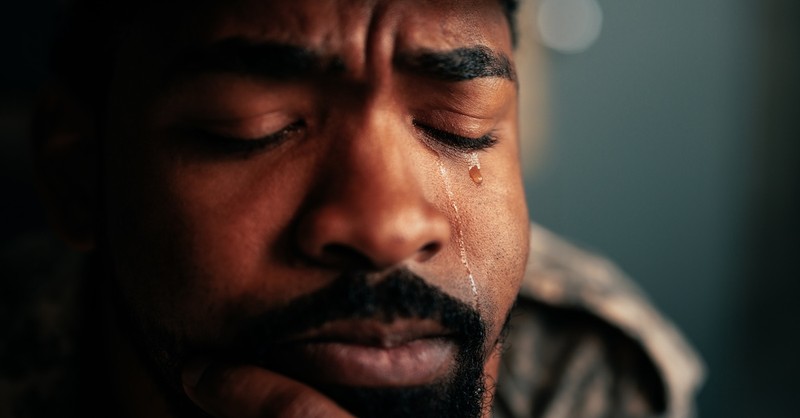
Losing a spouse is one of the hardest things anyone will ever have to go through. While I have never been married nor have I lost a spouse, my dad has. My mom passed away almost a decade ago, and he has been handling grief in his own way. Like many men, my dad was taught never to show emotions and never cry, even from a young age.
There have only been two times in my entire life that I have seen my dad cry, and one of these times was when my mom passed away. It broke my heart in ways that cannot be articulated. My sisters and I had lost our mom, and my dad lost his wife. The pain and sorrow of losing someone so close to you is never taught to us as children or even as adults. We are left to navigate our pain, feelings, and grief on our own.
This is something that my dad has had to do, and I'm sure you are also having to process your grief in the aftermath of the death of your spouse. My heart goes out to you; all the love, support, and kindness from the Lord is surrounding you. No matter what you feel right now, know it is valid. Whether you are feeling sorrowful, angry, or upset, all of your feelings are valid and not one goes unnoticed by God.
After witnessing my dad process grief, I have been able to learn many lessons. While none of these lessons were taught directly, I have observed them through my father amidst his own personal grief. I, too, have my own grief, which I'm still processing; however, those lessons are for another day. Here are five lessons in grief after losing your spouse.

1. There Is No Timeline
If there is anything that I have observed from my father's grief, it is that there is no timeline when it comes to grief and healing. There is not a set day when grief begins, and there is not an end day when the grief will leave you. After the passing of a spouse, you have lost half of yourself. When you marry your spouse, you become one flesh (Genesis 2:24). Once your spouse has passed, you have been separated from this united flesh.
As believers, we are not grieving in vain. We know our spouses are in Heaven with the Lord since they placed faith in Him; however, this doesn't mean we still don't miss them. Their laugh, their smile, and their love are all things we miss about our spouses after they are gone. They were our best friends, yet they were also the love of our life.
If you are grieving a spouse today, know there is not a timeline. Don't rush yourself and don't be hard on yourself if you are not healing the way you think you should. Even if it has been many decades since your spouse has passed, it is normal to still have periods when you grieve. You lost your husband or wife—never feel ashamed for missing them.

2. Some Days Will Be Better Than Others
After you lose your spouse, some days will be better than others. There might be a day this week when you feel perfectly fine. The sun is shining, you are meeting with friends, and work is keeping you busy. However, there may come a day next week when you are overcome with grief. This is normal as some days will be better than others.
Some days might be beautiful, and others will be full of tears. This is true not only for the first days after your spouse passes away, but it is also true for the rest of your life. Even if you remarry, there will be days when you will grieve your spouse, and that is okay. Rest in the promises of God that you will see them again in Heaven.
Until then, continue to lean on God. He will provide you with the comfort that you need. The Bible tells us, "He heals the brokenhearted and binds up their wounds" (Psalm 147:3). As we are told in this passage, He will heal our broken hearts and bind up our wounds. Turn to Him today and find lasting peace through His love.

3. Time Truly Doesn't Heal
Grief is not based on a timeline, and it is also not a factor in healing. As children, we are taught that time can heal all wounds. Similar to many things we are taught as children, this isn't true. Time truly does not heal all wounds. Your spouse could have passed away many decades ago, yet you still miss them terribly, and grief is always present in your heart.
This is because you loved your spouse so much. The greater the grief, the greater the love. It is understandable for spouses to take their time in healing, even if this means never fully healing from their loss on this side of Heaven. Our spouses are important people in our lives, and it is not shameful to grieve for them as long as you need.
There will come a day in the future when all crying, pain, and death will be eradicated (Revelation 21:4). Once this day comes, never again will you have to face another loved one dying. Instead of death, there will be life. As you are healing, lean on God. Know that He is always with you (Matthew 28:20b; Hebrews 13:5-6).

4. Memories Will Hurt & Heal
Another thing I have learned about the grief of losing your spouse from my dad is that some memories will hurt and others will heal. My sisters and I often recount stories of our mom, and some of them bring a smile to my dad's face, and others bring him sorrow. If your spouse has recently passed away, some of the memories that are shared with others will hurt, and others will heal. Try your best to reflect on the ones that heal and help you process your pain rather than the memories that hurt.
You won't be able to escape the painful memories and there will come a day when you will have to face them. However, for the time being, focus on the healing memories that bring joy. Once you are ready to focus on the more painful memories, find support in God. You can also seek out Christian therapy if you need further help. Therapy with Christian therapists who specialize in grief counseling can do wonders.
If therapy is not feasible right now, try your best to talk with loved ones about your spouse. Sometimes, we feel we might be "overbearing" for sharing our feelings, but our loved ones never think this. They want to be a shoulder to cry on and someone to share happy memories with. Tell your loved ones about your spouse and everything you loved about them.
This alone can help provide healing in your life and build a support system when the days are hard. Your loved ones truly care about you and want to help in any way they can. If this means listening to memories about your spouse, then they would be more than happy to be a listening ear. Reach out to a loved one today and allow them to be a safe place for you to share your memories.

5. Finding Hope in the Lord
Psalm 33:22 tells us, "May your unfailing love be with us, Lord, even as we put our hope in you." The Lord is our source of hope at all times, including in the aftermath of our spouse's death. His unfailing love will be with us, and we need to continue to put our hope in Him. The Lord is completely worthy of our hope as He has already proven Himself faithful (2 Thessalonians 3:3).
Find hope in the Lord during this time and keep leaning on Him. He will give you hope for better days in the future. You will see your spouse again, and you will be reunited with them in Heaven.
Look forward to this day with a heart of joy. Although marriage does not exist in Heaven, you will still have a special connection with your spouse. There is no reason to believe that God would separate what He has brought together.
Leave space for your grief and allow yourself to simply sit with your feelings. Don't try to suppress them or make them "go away." As mentioned, grief has no timeline, and we cannot rush the process. You will grieve a lot because you love your spouse so much. Our spouse is a very important person in our life and it is impossible to believe their absence wouldn't affect us. It does affect us because we love them and our love will be revealed in our grieving process.
God meets us where we are and will continue to give us hope. Even though some days will be unbeatable, rest in the Lord. He will provide you with everything you need and surround you with comfort. Go to Him today, present your requests, and find comfort in His love.
Originally published Thursday, 22 August 2024.










